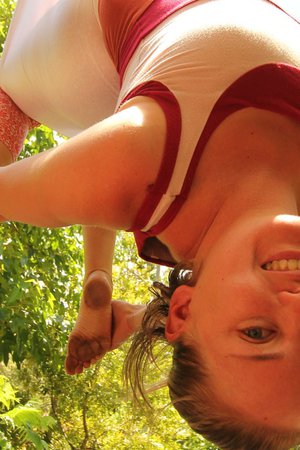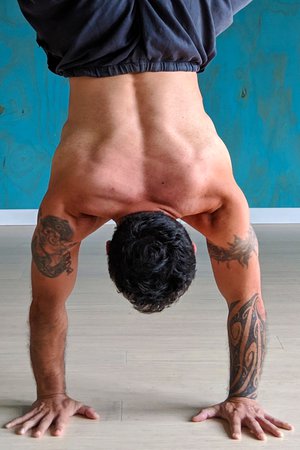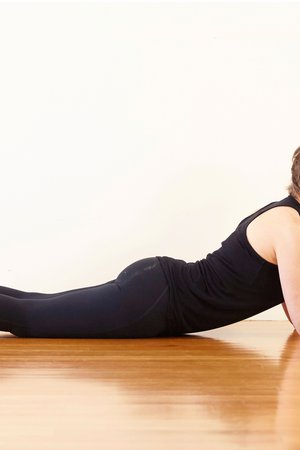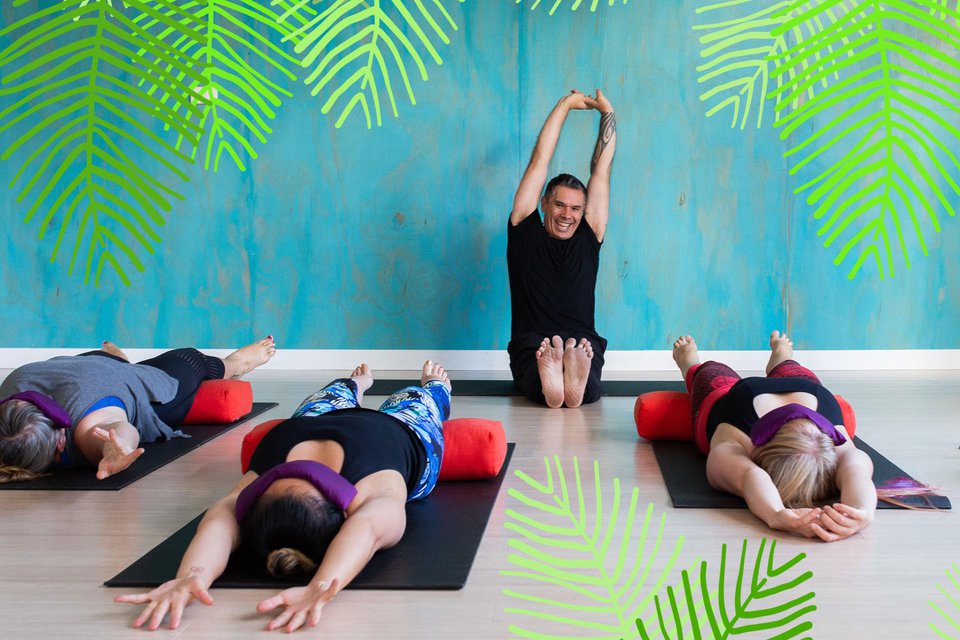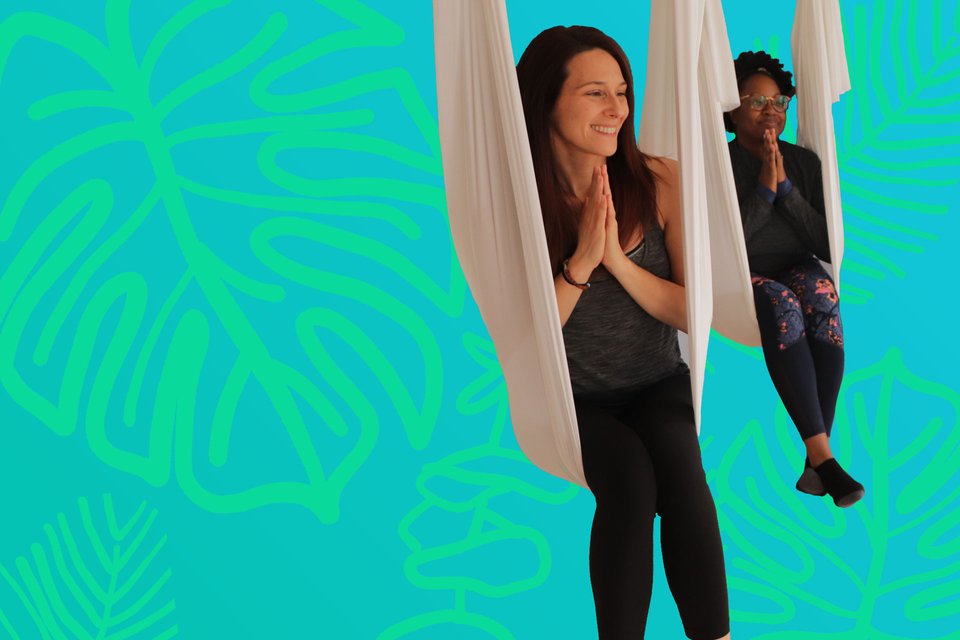Tim Seutter - Bringing The Fire
We sit down with Tim Seutter of Yoga Fire, ahead of his upcoming workshops at Garden of Yoga
Tim will be teaching 2 workshops at Garden of Yoga on Sunday November 24th. For more information read more here.
Can you tell us a little bit about your background and where you grew up?
I grew up as the youngest in my family of 5 in Edmonton, Alberta, Canada. My parents were both teachers and grew up attending the school my dad became a principal from primary through graduation. I grew up on a farm and so I spent a lot of my time as a child being a farm kid. I was raised in a strict, but loving, family. My family was very sports-orientated and I began skiing at 3, playing Ice hockey at 5 and other sports as I got older from soccer, baseball, football (gridiron) to martial arts.
Could you tell us a bit about your background with athletics?
I have loved playing sports from a young age, as I mentioned I started playing hockey at age 5. I remember when I was 12, my mother said I was getting too tall too quickly and so I was supposed to learn to play basketball. I remember being resistant to the idea as I thought hockey was enough.
Good thing she persisted because I spent my middle and high school years playing hockey, and basketball. It was while playing basketball that I was asked by a football coach if I wanted to play gridiron as they thought I could be a good match. So through a long story, I stopped playing hockey and fell in love with gridiron. I went from having zero idea about anything to do with football outside of watching it to becoming a starter on the high school team and even winning lineman of the year at the end of the season. It was a quick uptake. I eventually played gridiron all the way to university and played for the University of Alberta in a position called linebacker. Interestingly, I was playing gridiron and trying to figure out what I wanted to do with my life that the idea of becoming a firefighter emerged.
How did you come to work as a firefighter?
Yeah, great question. I was in university, studying to become a history professor…who would have ever thought of that! I had spent 4 years in a library studying and playing sports and the idea of spending the rest of my life reading latin or researching papers and living the university life seemed all of a sudden dull. I looked around at my prospects and considered following my father’s footsteps and become a teacher and that didn’t really appeal to me either. So I looked at the police, yeah tough job and didn’t seem to fit and then I thought, I should be a firefighter and like that, I put
everything into achieving this. Little did I know that the seeds for being a firefighter had been planted earlier as when I was 10, I won fire chief for the day with my local fire brigade and I still have the firehat they gave me 30 years ago!
Anyways, I was initially denied entry in fire service as I hadn’t done well enough initially to be chosen. There were over 1100 applicants for 40 jobs and I was young and naïve and it just wasn’t my time yet. I tried again and failed again and then I decided this wasn’t going to happen a third time. Then 9/11 happened and I was playing gridiron in University and with the chaos that happened from there, Edmonton Fire Rescue tracked me down and said they were going to hire 20
more people and they were interviewing 35 of us to compete. So I put 100% into this and I was hired and promptly walked into my coaches office and told him, I was sorry I couldn’t fulfil his plans for next season but I was off to become a firefighter. I was over the moon!
What brought you to New Zealand?
I was sitting around in 2010 in Canada and it was a harsh winter and I was working as a firefighter in Canada and loving my job but I was sick of fighting house fires at -40C or car accidents and everything about living in cold climate in Canada. In fact, I said I want to quit it all, move to the tropics and live on a little island called Roatan. My wife was not as interested but said, I would move to New Zealand...I was thinking New Zealand, yeah right…well the seed was planted and I started to research the idea and found out we could get residency there with our skills/qualifications. We thought, why not try a firefighter exchange and see if we want to go on an adventure for a year with our kids or make this a permanent endeavour. Next thing, we get a call out of the blue that someone from NZ wanted to do the exchange with us and through a 6 month period we went from a concept of going on an adventure to arriving in New Zealand to try out being a firefighter and living a completely different life than what we had ever experienced or ever thought we would do. A whole bunch of things happened that paved the way for us to stay, and so we did and haven’t looked back.
How did you discover yoga?
I had never really considered yoga and growing up my parents were quite religious, so yoga was never encouraged at all. So I lived my life and did my things. When I was in my late 20s, I was heavily involved with Brazilian Jiu-Jitsu and I was helping some friends prepare for their trip to train/fight there. One of the guys tried hot yoga, Bikram, to be specific and said I should try it cause it was so hard. I was pretty sceptical of that, as like I mean, how hard can yoga be? Well, it nearly killed me, highly inflexible, muscle-bound body in a room of 40 people in 40C….yikes. It was so hard and I was so intrigued that something that I perceived was so easy was kicking me all over. I kept on going cause I loved the heat, I loved the sweat and I noticed my injuries from sports were reducing and I was feeling light instead of heavy. I kept practicing more and more and even started doing yoga DVDs in the fire station.
I imagine firefighting can be stressful and intense - do you think yoga better equipped you to handle some aspects of the job?
Yes, this is an interesting question because all emergency services have intensity and stress with them from police, ambulance, fire and nurses and medical professionals. In different ways but yet the same, people expect and hope you to deliver miracles and you put that pressure on yourself also. You want to tell the good story of saving someone, not the bad one with the carnage or sadness or whatever you see on a shift. As a firefighter, you’re at the fire station, doing anything
and immediately, you drop everything, you are on a truck and you’re speeding to something and when you get there you have a minute to figure out what to do and get that happening. What I noticed with yoga was that as I did it more, I was accessing deeper into the things that I had seen being a firefighter for years already and the tough exterior I had put around myself to do my job, wasn’t a long term solution. Yoga taught me to get in touch with my feelings and learn to
understand that it was all right to be sad, to feel grief when a call was awful, and to be myself and be confident in who I was becoming and not what I thought I should be. So yoga gave me confidence to live life differently, to be in touch with how I felt, to allow myself empathy for myself as well as others around me who may have had similar struggles.
There is a delicate nuance to this though, yoga stops you from putting bricks or burying things deep and this is something a lot of firefighters do to maintain the façade that life is fine, there is no struggle with PTSD and just getting on with it. So as people do yoga, in emergency services there is going to be some time to understand how the trauma they have witnessed has impacted them.
Fortunately, yoga gives us tools to deal with this through mediation, breathing exercises and doing gentle forms of the practice. This is when yoga moved from being a physical pursuit to a life-altering experience. I learnt to practice meditation and learn ways to release the pressure but there were some challenges with that. When you open the box and search deep down, there are things we have to deal with and yoga brings these forward. What we need to do, is learn to be kind to ourselves. Not in the cliché form, I mean actually listening to the body and mind, and doing the things you need to be resilient. For me, this has meant meditation and trying to do it every day.
I’ve noticed that often people who work in fields that are all about helping others (like nursing), often find it challenging to prioritize self care, and are often exhausted and injured. Is this pattern also true for fire-fighters?
Very true indeed. Firefighters are really good at seeing someone else’s problem, and finding a quick and efficient way to fix it. That’s what we train for, what we are paid for. To solve problems and its common for others to think, “well, we don’t have a solution so we will just call the firefighters, they will figure it out”.
The problem is that who do you turn to when everyone turns to you because you supposedly always have the answers? This is what I have seen from my 17 years as a firefighter in myself and the many different firefighters I have worked with. I know a significant number of firefighters who have unfortunately committed suicide due to the desperation of how they feel. In my own career, a couple of years ago, I hit a crisis and I spent a significant amount of time off the job and trying to find solutions to the cumulative effects of witnessing trauma for years had done to me. In a flash, I had all the answers and suddenly it all came out and my life was in a crisis. It wasn’t an easy journey but I did make my way back and I’m again working full-time as a firefighter. There was a time where I was ready to quit and leave the job.
So to come back to the original question, firefighters are amazing at helping others, and awful at asking for help for themselves and unfortunately, the statistics of self-harm incidents are rising in firefighters and all emergency service workers. It’s being recognized there is a problem but there is a lot more that could be done to help men and women do this job and stay resilient and kept their minds healthy.
Have you noticed that fire fighters tend to favor a more intense or more gentle practice? Or a mix of both?
I would say that most firefighters I have worked with would originally go for the intense version. There is something about being a firefighter and be paid to run into burning buildings; takes a certain kind of person who runs in when everyone else is running out. What I had to learn and what other firefighters may need is a more gentle practice, to gently release the trauma that has been stored in their bodies from all the hundreds of calls and years of stressful situations they have experienced. There is talk these days about trauma-informed yoga and using these techniques to teach yoga differently. I would say, from my experience doing yoga and teaching yoga in a fire station that this isn’t the best tact to begin with. From a male perspective, to really get what yoga is trying to do and what the asanas are capable of, a more physical practice is a good place to start.
Let’s get the body healed, get people in touch with it and then from there give them options that will allow them to find the right style that will work for them.
I think as a yoga teacher and a firefighter, I want to encourage everyone I come into contact with to just try it, lose the ego and feel its effects. It’s particularly hard for athletes or firefighters not to be good at something right away and when you try yoga, it's just plain hard, no bones about it. And this is where some of the firefighters I know, have resisted yoga. They know if they run a bunch or lift weights or do something physical, they will release tension, get a workout and in the short-term feel better. However, these aspects never go any further whereas yoga is always pushing us to the present and dealing with the things that are bothering us. These are the areas that can make first responders wary as its easier to bury the feelings then it is to face them. Yoga brings out the unknown and when you start, it isn’t easy.
We found this interesting quote while doing a little research, and I was wondering what you thought -“As I got deeper into my own study of yoga, I realized that this practice is not just “good” for first responders; it is meant for them. Why? Because the original and true intents of yoga are to obtain a mastery of the mind and achieve an optimal functioning of the entire being — from the subtle nervous system to the whole physical body. This authentic objective of yoga is thousands of years old, with no relation to how recent Western culture has marketed it as trendy and hip.”
Yeah I would agree with this statement. Yoga helps bring us to being a better version of ourselves and dealing with the things that are bothering us. For me, the biggest thing I learnt was how I was feeling grief at calls. I was sad for the loss the family had, or feeling the anguish and grief that people felt seeing a traumatic car accident or their loved one being a live one minute, and then next, their light is extinguishing. It took me a lot of years to understand that although I didn’t cause the situation, I was just trying to help, it would try and suppress the grief and just got on to the next call and get on with life. Through meditation and moving my practice from primarily being asana based to learning the subtle practices and deeper meanings of yoga and becoming more resilient to what I face as a firefighter. So through yoga, I am learning to master my mind, and hopefully function more optimally.
Fire fighting is obviously a very physically demanding job, what kind of training do you regularly do as part of the job?
Well, for me I do yoga every shift I can. In New Zealand, we are allocated an hour of PT to keep up our fitness. Most people do conventional exercises, cardio and weight-training. I did this program also for many years. I now focus primarily on doing yoga through that time as its vital to keeping my body and mind healthy. I spent many years lifting weights and now I’m more interested in going deeper.
Outside of physical training, we train different skill sets pretty much every shift. So as a firefighter, you are always trying to keep your skills up because you never know when its 3am and you have life/death decisions to make in split seconds where a missed skill can cause immediate negative effects.
Has yoga enhanced it?
Yoga has become my go-to for everything. I try and spend every shift doing something with my body. Sometimes the asana is intense as I like the physical challenges but I have learnt I need to balance that when I need to slow down, and find my meditate practice. Yoga has helped me stay calm and to keep my mind clear so I can try and perform when I’m needed. I’m far from perfect but yoga has taught me to try my best, be in the present as best as I can, and try to live a good life.
Is this a job you could do until your 60s or is it too intense physically?
I find it amazing to see people work in this job into their 60s and even in NZ into their 70s. Being an officer as you get older moves you from being involved with doing the work and more about strategy and maintaining the station and looking after the people on your crew. In Canada, there was a pension scheme that allowed people to do the job for 30 years and then choose to resign with a decent amount of money to live the rest of your days. In New Zealand, that isn’t the same scheme and so many firefighters have worked 40years plus as firefighters until they are 65. In Canada, there
was forced retirement by age 60 so I had never seen anyone in their 60s until I came to New Zealand. I think as you get older, you become smarter so you won’t be as strong as someone in their 20s/30s but experience and knowledge will always trump physical ability. So the older you get, the smarter and doing the job more efficiently.
How did you come to specialise in working with athletes?
Being an athlete and having a ton of injuries I wanted to try and help athletes perform at their best but be able to eliminate needless soft-tissue injuries. I had a promising gridiron career and instead I ended up with over-trained and tight body and a multiple shoulder dislocations that made my time on the field limited due to the threat of further injury.
I have been fascinated with athletes and how some have all the ability and yet never make it while others have the perseverance to never quit and somehow make it pretty far. I look at yoga as being the connection between all the things an athlete is trying to do to be their best. The mental side of yoga and remaining calm, under intense pressure from fans, sponsors, teammates and how to stay resilient so that you can do the sport you love; all these aspects really interested me. I recently spoke to an athlete I’ve worked in the past with who is currently at the top of his sport and position tell me he is having a hard time fitting in recovery and stretches after competition. He is young so he can play through that, but to keep a long term career, you need to learn to rest. I’m also quite interested in using yoga because it takes athletes out of their usual range of motion and helps create efficiency in the body. Its like keeping your car performing at its best, its not just the fuel it’s the oil changes, the filters, tires, all the things you need to have working optimally to have the car at its best. In the same way, yoga creates an efficient body, reduces soft-tissue injuries, but the thing I am most passionate about, is a clear, and focused mind by learning to be in the present, breathing and being able to overcome adversity. A high-level athlete has determination and grit but instead of relying on these solely, with yoga you get can use these as a tool of a clear, stress-free mind that doesn’t dwell on mistakes of yourself or teammates and works to achieve the goal.
How does working with athletes differ from your average student?
Athletes, like firefighters, have a hard time being perceived at being bad at something. As an athlete, you have worked hard at your sport, and you’re good at it. When they come to yoga, they have to go back to the beginning and with the increased muscles and tightness, a lot of work has to be done to get proper range of motion back.
A typical student I see at my studio, is coming to yoga, because they want a solution to their particular problem. Maybe they have injuries or they are stressed or maybe their have other challenges and they come with a little bit of fear and wonder about what will happen once they give yoga a try.
How do you encourage athletes towards the more subtle and gentle aspects of yoga?
Definitely, and this is where they have some of the challenges. Being switched on, performing, nutrition, winning, sponsors, earning enough money, relationships. The modern athlete has so much on the go on the field and off and so I try to steer them to the gentler aspects. Most, however, need time to see the value of that so I try and meet them where they are and then encourage them to use the whole yoga practice, mind and body, to achieve what they want, perform at their best, and reduce stress and anxiety.
How did you come to teach SUP yoga?
I live near the ocean and I thought, wouldn’t yoga on water be a new challenge. A friend had a SUP tour company and so we teamed up and started doing events with SUP yoga. I called my thing H2Om and I really enjoyed being outside, on the water, linking my practice to nature and showing people that if you engage and you’re present, you will be find the practice exhilarating. I know there are traditionalists who say it isn’t real yoga but I disagree.
Besides being on the water and on a board, how does SUP yoga differ from normal yoga?
It’s biggest difference is that if you are not completely linked to every aspect of your body, mind and breath, you will probably fall off your board and get wet. The moment you drift away, which can happen in a typical studio, you will face a consequence. You may only nearly fall in or you will fall in spectacularly. SUP yoga forces you to do everything you are told to do in land yoga but since you are in nature, you learn that if you are not entirely in the present in your mind and body, you can fall. This happens in land yoga all the time, but when we fall, we step to the side of our mat, or touch a wall, usually…In SUP yoga, you also have to learn to move slowly and probably do postures you can do easily on land but on a SUP are quite difficult. Warrior 1 is an intricate pose but on land we take it for granted we can make adjustments. Turn the hip her, move arms there. In SUP, if you do that flippantly, you will fall. You need to be slow, methodical, concise and let the idea go that range of motion and how deep the pose it important go. These are lessons we need to learn when we practice in a studio but aren’t always done because the ground beneath us is always solid and supported. Water, is fluid the ocean is moving, the earth is alive, you tap and feel that all around all at once and it can be a powerful experience.
If you could distil everything you have learned and everything you teach down to one core thing - what would it be?
Perseverance. I have learnt that the yogic path isn’t flashy, its living differently, its trying to be your best but also forgiving yourself when you’re at your worst. Its being strong and confident and also being gentle and practicing a life where you try to live in balance.
We spoke with Tim for an episode of The Flow Artists Podcast - to hear more from Tim, listen to his episode here.


